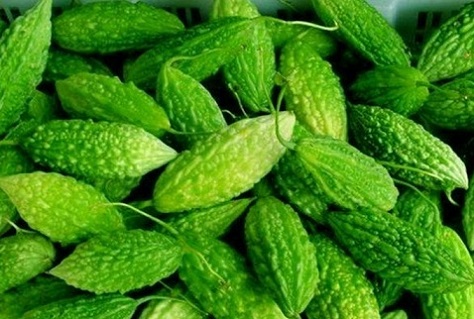Taiwanese Study Reveals Heart Health Benefits of the Phytochemical Momordicine I from Bitter Melon
Nikhil Prasad Fact checked by:Thailand Medical News Team Oct 01, 2024 1 year, 4 months, 2 weeks, 1 day, 4 hours, 21 minutes ago
Herbs And Phytochemicals: A Natural Compound with Big Health Potential
Researchers from various institutions in Taiwan, including Taipei Medical University, Linkou Chang Gung Memorial Hospital, and China Medical University, have discovered significant cardiovascular benefits from a natural compound found in a common plant: bitter melon. This
Herbs And Phytochemicals news report explores these findings and delves into the study's exciting potential.
 Taiwanese Study Reveals Heart Health Benefits of the Phytochemical Momordicine I from Bitter Melon
Taiwanese Study Reveals Heart Health Benefits of the Phytochemical Momordicine I from Bitter Melon
Bitter melon, known scientifically as Momordica charantia, has been a staple in traditional medicine for centuries. However, one particular compound from this plant, called Momordicine I, has drawn considerable attention for its potential to treat cardiovascular diseases, diabetes, and more.
What is Momordicine I?
Momordicine I is a bioactive compound that belongs to a group of chemicals known as cucurbitane-type triterpenoids. Found in bitter melon, a tropical vine common in Asia, Africa, and the Caribbean, this compound has demonstrated powerful medicinal effects in preclinical studies. Momordicine I has been shown to possess anti-inflammatory, antihypertensive, antifibrotic, and antioxidative properties, making it a strong candidate for treating heart disease.
Heart Health Benefits Unveiled
Cardiovascular diseases, such as high blood pressure and heart failure, remain leading causes of death worldwide. As people look for more natural ways to improve heart health, researchers are increasingly interested in the therapeutic potential of plant-based compounds like Momordicine I. Here's what the scientists found:
-Anti-Inflammatory Effects
Chronic inflammation contributes significantly to cardiovascular diseases. The study demonstrated that Momordicine I has a strong anti-inflammatory effect. It can inhibit key pathways in the body that lead to inflammation, specifically blocking the expression of pro-inflammatory cytokines, such as TNF-α and IL-6. By reducing inflammation, Momordicine I could protect the heart and blood vessels from damage.
-Antihypertensive Benefits
Hypertension, or high blood pressure, puts extra strain on the heart and can lead to serious complications. The study found that Momordicine I helps lower blood pressure by relaxing blood vessels. It achieves this by modulating the production of nitric oxide, a molecule that helps blood vessels expand, reducing resistance to blood flow.
-Protecting the Heart Muscle
Momordicine I has been shown to reduce the risk of cardiac hypertrophy, a condition where the heart muscle thickens due to high blood pressure or other stressors. This thickening can lead to heart failure over time. In preclinical studies, Momordicine I prevented heart cells from growing too large and helped maintain normal heart function, even under stres
s. This is crucial because once the heart muscle thickens, it becomes less efficient at pumping blood, which can lead to severe complications.
-Antioxidant Power
Oxidative stress, caused by an imbalance between free radicals and antioxidants in the body, is a known factor in cardiovascular disease. The researchers discovered that Momordicine I helps neutralize harmful molecules known as reactive oxygen species (ROS). By doing so, the compound protects the cells lining the blood vessels from oxidative damage, keeping the arteries healthy and reducing the risk of atherosclerosis (the hardening of the arteries).
-Fighting Fibrosis
Cardiac fibrosis, where the heart tissue becomes stiff and scarred, often accompanies diabetes and high blood pressure. Momordicine I significantly reduces the production of collagen, a protein that contributes to this stiffening. By blocking the transforming growth factor (TGF-β1) pathway, the compound prevents fibrosis, ensuring the heart remains flexible and capable of pumping blood efficiently.
How Does Momordicine I Work?
The study proposed several mechanisms by which Momordicine I exerts its benefits. One major pathway involves the inhibition of NF-κB, a protein complex that controls the production of substances that cause inflammation. By blocking this pathway, Momordicine I prevents excessive inflammation, a key factor in many chronic diseases.
Additionally, the compound was found to activate the Nrf2/HO-1 pathway, which boosts the body's antioxidant defenses. This pathway is crucial for reducing oxidative stress and maintaining heart health. Lastly, Momordicine I helps regulate enzymes that control blood pressure, such as angiotensin-converting enzyme (ACE), further contributing to its antihypertensive effects.
Safety and Future Research
While the study's results are promising, researchers emphasize that more work needs to be done. Most of the findings come from preclinical trials, meaning they were conducted in lab settings or on animals. Clinical trials in humans are necessary to confirm the safety and effectiveness of Momordicine I as a treatment for heart disease.
However, early signs indicate that the compound could be a game-changer in how we approach cardiovascular health. Because it is derived from a natural source, it may offer fewer side effects compared to some synthetic medications. Still, researchers caution that high doses of Momordicine I could lead to adverse effects, so understanding the proper dosage will be key in future studies.
Conclusion: A Promising Future for Heart Health
In conclusion, the findings of this study open the door to new possibilities in the prevention and treatment of cardiovascular diseases. Momordicine I has shown the ability to protect the heart by reducing inflammation, lowering blood pressure, preventing fibrosis, and fighting oxidative stress. The potential for this natural compound to be developed into a therapeutic option could provide a much-needed alternative to current heart disease treatments, especially for those seeking more natural approaches to health.
As always, more research is needed to confirm these effects in human patients and to determine the best ways to administer this compound safely. But the outlook is promising. Momordicine I may soon become a key player in the battle against heart disease, offering hope for millions around the world who suffer from cardiovascular conditions.
The study findings were published in the peer-reviewed International Journal of Molecular Sciences.
https://www.mdpi.com/1422-0067/25/19/10518
For the latest on
Herbs and Phytochemicals, keep on logging to Thailand Medical News.
Read Also:
https://www.thailandmedical.news/news/herbs-and-phytochemicals-ilex-pubescens-protects-heart-after-myocardial-infarction
https://www.thailandmedical.news/news/herbs-and-phytochemicals-1-8-cineole-from-eucalyptus-is-a-natural-antithrombotic-agent
